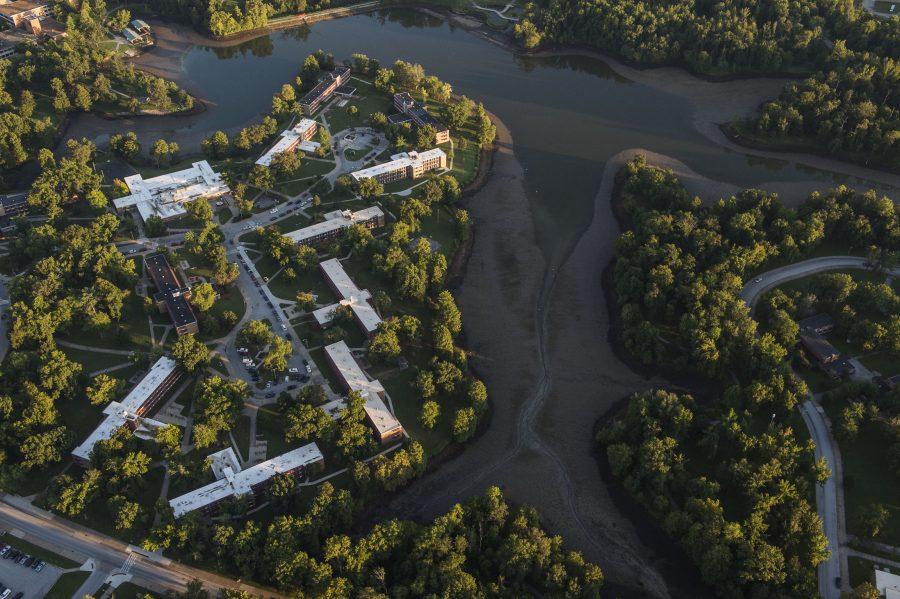Green Fund Project to promote recreation at Campus Lake while helping ecosystem thrive
February 28, 2018
In the past year, Campus Lake has been transformed from a half-empty hole to what will soon be a renovated hub for outdoor recreation.
A group of students and faculty, supported by SIU’s Green Fund, are designing and building a recreational area to increase activity around the lake next to Thompson Point.
The group is also being proactive in keeping cyanobacteria levels down, thus preventing another toxic algae outbreak like the one that temporarily closed Campus Lake in 2015.
Advertisement
The Eco-Rec Green Fund project is an example of how SIU’s outdoor spaces can be used as learning laboratories, said Geory Kurtzhals, SIU’s sustainability coordinator.
“It is practical, real-world problem solving that will serve our students well in the future,” Kurtzhals said. “In addition, it extends the boundaries of the classroom and provides a model example of sustainability-minded problem solving accessible to the public.”
Some of the project’s main features will include at least one stationary bike to help aerate the lake’s water when peddled, linking the individual’s cardiovascular health to the lake’s health.
Current plans install the bike near Bucky Pavilion by May, said Marjorie Brooks, a zoology professor and lead on the project.
Students are also creating prototypes for at least one solar-powered fountain that would sit on a flotation device and shoot water up to ten feet in the air, she said, adding that it could also act as an obstacle course for kayakers.
The combination of bicycle and fountain, along with the creation of a nearby wetland, would help aerate and cool the lake’s water, which is important when preventing growth of cyanobacteria, which feeds on warm, stagnant water.
The project, budgeted at just less than $30,000, is in its first year of funding. This cost includes building material and a salary for Rachel Steiger, the graduate assistant selected to help lead the project.
Advertisement*
Steiger, a masters student in zoology, said the most rewarding aspect of her work is seeing how much the campus and local community care about the project and the lake’s future.
Steiger is responsible not only for testing for water quality improvements in the lake throughout the implementation of the project, but also for surveying how the community and the students involved in the work value the project and the lake. Individuals from outdoor recreation, biology, zoology, engineering, industrial design, physical plant, design and Sierra Club’s Shawnee Group are all assisting in the project effort.
For the past four years, Campus Lake has closed periodically as cyanobacteria levels rose. The toxic blue-green algae blooms that resulted had the potential to cause health concerns affiliated with the high levels of nutrients.
When the lake was closed, people were advised to stay away from the water, as contact with it had the potential to cause rashes.
In September 2016, contractors began draining Campus Lake into Piles Fork Creek, lowering the water level six to eight feet and exposing about 20 acres of shoreline.
This allowed workers and volunteers to help remove decomposing plant material — which cyanobacteria fed on — from the shoreline. This dead matter was also a source of the foul odors that would linger around the lake during times of higher cyanobacteria levels.
The university paid a local contractor $350,000 to remove about 46 million pounds of the dead material. In 2015, the university also spent $63,500 on dye, smoke and camera tests to try and reveal the source of what was found to be an unusually high presence of fecal matter in the water that was believed to be contributing to the cyanobacteria growth.
The lake has since restored itself: the water level has risen and the old odor is gone.
The Center for Environmental Health and Safety monitored the water all summer and didn’t see an outbreak of toxin levels, so the water is safe for recreation now, Brooks said.
Brooks said she’s always had the mindset that people are part of the ecosystem, and this project helps promote that concept.
“When ecosystems thrive, people thrive,” Brooks said, adding that Jeff Goelz said he hopes people will soon say, “Campus Lake is my workout partner”.
Jeff Goelz, assistant director of recreational sports and services at SIU, said many people have a love for and fond memories of Campus Lake.
He said a really active community at the lake has been missing these past few years because of the algae outbreak, and he hopes to see that change with the improved lake health and April 30 grand opening of Becker Pavilion.
“When the lake fell on hard times it was really imperative that we all come together as a university community, and a community in general in southern Illinois to bring the lake back to its glory years,” Goelz said. “Now that we’re back to a good a balance, I think everyone’s excited to get back out there and utilize that really unique feature that we have.”
Staff writer Anna Spoerre can be reached at [email protected] or on Twitter @annaspoerre.
To stay up to date with all your southern Illinois news, follow the Daily Egyptian on Facebook and Twitter.
Advertisement









Mark Meyer • Mar 1, 2018 at 10:06 pm
If you want to “bring the lake back to its glory days,” you’d open the beach again! When we were at school, we had huge popular beach parties. When we had a reunion in 1990, one of the planned events was a beach party. The campus beach was a unique feature of SIU! EVERYONE loved it! Bring it back! You won’t regret it.
Mark Meyer – Alumnus 1974 & 75